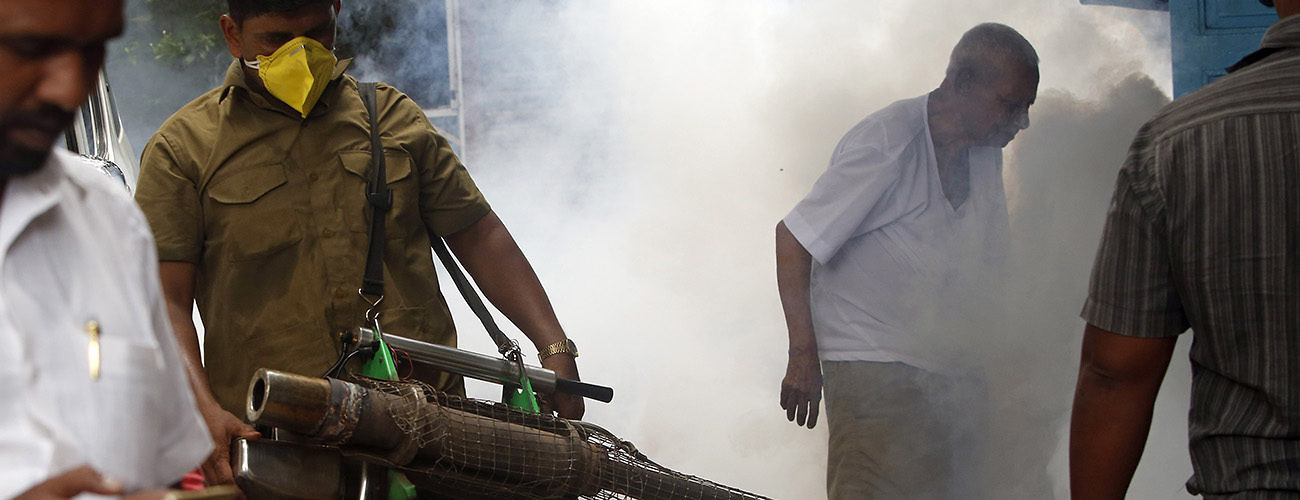A municipal worker fumigates an area outside a train station to halt the spread of mosquito-borne diseases. Mumbai, India, September 3, 2016 (Rajanish Kakade/Associated Press)
On May 26, the World Health Organization (WHO) announced that it had confirmed three cases of the Zika virus, including two in pregnant women, in the province of Gujarat, India. While no cases of microcephaly or other birth defects have been reported, the news comes amid revelations that Indian authorities kept secret knowledge of the cases for up to six months by neither notifying WHO nor the Indian public.
Explaining that it didn’t want people to start panicking while it put in place counter-measures, the government waited until May 15 to disclose laboratory test results from a 34-year-old pregnant woman who was confirmed positive for Zika on January 4. Already prompting concern and confusion on the domestic stage, it remains to be seen whether New Delhi’s lack of transparency could set a risky precedent by encouraging other nations to flout global expectations and limit their reporting of diseases to WHO.
India’s secrecy likely reflects a strategic assessment of the public health risks versus perceived costs to its reputation, economy, and tourism. Following the discovery, for instance, WHO increased India’s risk assessment from Category 4 to Category 2, placing it in the same category as Brazil, which has a higher prevalence (India has confirmed three cases among over 36,000 human samples tested so far). Earlier in the year, the United Kingdom issued a travel advisory for pregnant women visiting India, and other countries may follow suit.
Regardless of its calculations, India’s actions run counter to global norms on the need for transparency during disease outbreaks. India is a signatory to the International Health Regulations (IHR), a binding treaty that holds nations responsible for reporting epidemic-prone diseases to WHO within 24 hours. India and 195 other state parties agreed in advance to notify WHO of “any [disease] event of potential international public health concern” that meets a partial set of criteria, such as whether there is a risk it could spread internationally or have a serious health impact.
India’s non-disclosure may be surprising considering that most countries are believed to comply with the IHR most of the time, given adequate resources and capacity. For instance, research by Simon Rushton and Adam Kamradt-Scott reveals that during the 2009 H1N1 (bird flu) pandemic, only around 10% of countries contravened WHO rules and recommendations against applying restrictive health measures, such as quarantines, with the vast majority complying with the treaty. In addition, the growth of social media and other information technologies means it is becoming increasingly difficult for countries to conceal outbreaks, although some have tried.
During the SARS epidemic in 2003, China famously denied the existence of the virus on its soil for weeks and concealed visits by WHO inspectors. Experts agree this hampered global cooperation and led to a worse overall outcome, including facilitating the spread of SARS to other countries. Because an epidemic in one nation threatens all others—a result of increasing global interconnectedness—the IHR were revised in 2005 to codify increased transparency and prevent another reccurrence of the SARS situation.
All of which makes India’s lack of transparency in this case more puzzling. According to reports, Indian health ministry officials maintained they “made a decision following [national] protocol.” They justified non-disclosure with WHO on the grounds that the world health body determined that Zika is no longer a Public Health Emergency of International Concern, or PHEIC—the highest alert level available—as of November 2016.
However, the IHR implies that countries must report diseases according to the aforementioned criteria, regardless of PHEIC status, since a disease which loses its PHEIC status could presumably regain it later. Other countries adopting a similarly narrow interpretation of the treaty as India would have extraordinary leeway to decide what to share (or not share) with Geneva. This would likely undermine WHO’s mandate and authority as a supranational health body.
In addition, in the absence of a “world health court” or other adjudicatory mechanism to determine who is in the right legally, it is up to WHO and its member states to set the parameters of appropriate conduct and behaviors, as well as to punish violations. Many experts have therefore called on WHO to show a greater leadership role by naming-and-shaming countries which overstep the boundaries of the IHR or fail to take appropriate action against public health risks.
Consequently, delicately but firmly raising this issue with Indian officials could help to prevent deviations elsewhere and send an important signal that WHO takes transparency and other global health norms seriously. With newly elected WHO Director-General Tedros Adhanom Ghebreyesus preparing to take the reins of leadership on July 1, it could be the first test of his willingness to call out secret behavior and uphold international laws on openness and transparency.





